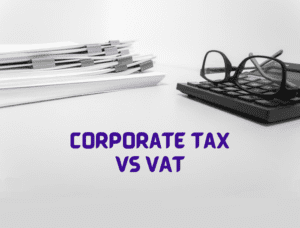Introduction
The UAE has introduced significant updates to its corporate tax regulations, shaping the financial landscape for businesses operating in the region. Staying informed about these changes is crucial for companies to remain compliant and strategically plan their tax obligations. This blog will explore the most recent updates, their implications, and how businesses can navigate the evolving corporate tax framework in the UAE.
Recent Changes in UAE Corporate Tax
1. Implementation of Corporate Tax (Effective June 1, 2023)
The UAE introduced a federal corporate tax, effective for financial years beginning on or after June 1, 2023. The key features of this tax include:
- Standard Corporate Tax Rate: 9% for taxable income exceeding AED 375,000.
- Exemption for Small Businesses: Profits up to AED 375,000 are not subject to tax, supporting startups and SMEs.
- Global Minimum Tax for Large Corporations: Multinational companies with global revenues exceeding €750 million are subject to a 15% tax rate, aligning with the OECD’s Global Minimum Tax framework.
2. Domestic Minimum Top-Up Tax (Effective January 1, 2025)
To align with international tax standards, the UAE government announced introducing a Domestic Minimum Top-Up Tax (DMTT), effective January 1, 2025. This tax ensures that large multinational enterprises (MNEs) meeting the €750 million revenue threshold pay a minimum effective tax rate of 15%. The aim is to curb tax avoidance and maintain compliance with global tax policies.
3. Mandatory Tax Registration for Natural Persons
The Federal Tax Authority (FTA) has made it mandatory for natural persons conducting business activities in the UAE to register for corporate tax before March 31, 2025. This applies to individuals generating a business income exceeding AED 1 million annually. Failure to comply could result in penalties.
Implications for Businesses
Compliance Requirements
With these corporate tax updates, businesses must ensure:
- Timely tax registration and compliance with new regulatory deadlines.
- Accurate financial reporting to meet corporate tax obligations.
- Understanding of tax exemptions and incentives to optimize financial planning.
Impact on Multinational Enterprises
The Global Minimum Tax and DMTT will primarily affect large corporations operating internationally. These businesses must evaluate their tax structures and ensure they adhere to both local and global tax requirements.
Strategic Financial Planning
Companies must assess their tax liabilities and seek expert guidance to minimize risks. Engaging with tax professionals can help businesses navigate the evolving tax landscape, ensuring compliance while optimizing tax efficiency.
How Limrise Can Help
At Limrise, we specialize in corporate tax advisory, helping businesses stay compliant and make informed financial decisions. Whether you need assistance with tax registration, compliance strategies, or financial structuring, our experts are here to guide you.
Conclusion
The recent changes in UAE corporate tax signify a shift toward a more structured and transparent taxation system. Businesses must stay informed, comply with regulations, and seek professional tax guidance to ensure smooth operations. By adapting to these updates proactively, companies can position themselves for long-term success in the UAE’s evolving business environment.
Contact Us Today!
📞 +971 50 786 2491 | +971 55 285 2393
✉️ hello@limrise.com







